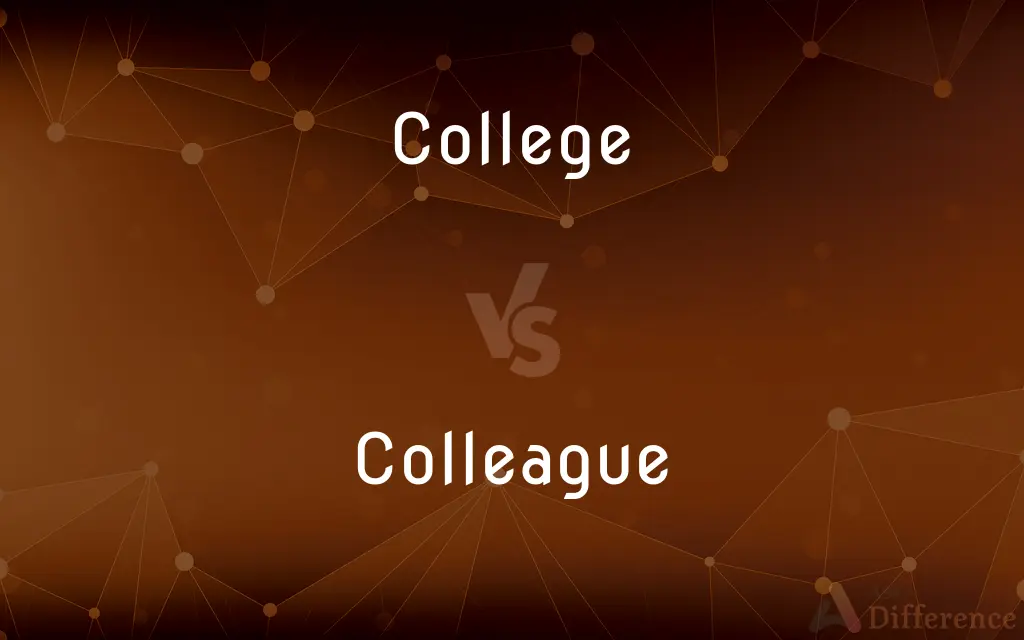College vs. Colleague — What's the Difference?
Edited by Tayyaba Rehman — By Fiza Rafique — Updated on April 22, 2024
College refers to an institution of higher education, offering undergraduate or postgraduate degrees, while colleague denotes a coworker, typically within the same profession or organization.

Difference Between College and Colleague
Table of Contents
ADVERTISEMENT
Key Differences
College is an educational institution that provides higher education and academic degrees, focusing on broad knowledge and specialized fields. In contrast, colleague refers to someone you work with, often within the same company or professional environment, sharing similar job responsibilities or objectives.
Colleges are integral to academic growth and personal development, offering a structured environment for learning and research. Whereas colleagues are pivotal in a professional setting, providing support, collaboration, and shared expertise to enhance productivity and workplace dynamics.
While colleges often require a formal admission process, including applications, tests, and interviews, a colleague relationship typically forms through employment in a shared workplace without such prerequisites.
Colleges may charge tuition and fees for educational services and credentials, while colleagues are not tied to financial transactions within the scope of simply being coworkers but may involve financial aspects in professional dealings or projects.
Colleges operate on academic calendars with scheduled courses and semesters, whereas the interaction with colleagues is generally continuous and evolves with the work environment and projects at hand.
ADVERTISEMENT
Comparison Chart
Definition
An institution of higher learning offering degrees.
A coworker within the same organization.
Primary Function
Education and granting degrees.
Collaboration and support in a work setting.
Requirements
Admission processes, tuition fees.
Employment at the same company or team.
Financial Aspect
Charges tuition and fees for services.
No direct financial transaction as coworkers.
Duration
Fixed academic periods (semesters, years).
Duration of employment or project tenure.
Compare with Definitions
College
A secondary or high school in some countries.
She attended a college preparatory school.
Colleague
A fellow member of a profession, staff, or academic faculty.
His colleague in the history department recently published a new book.
College
An institution of higher education that awards academic degrees.
She graduated from college with honors in psychology.
Colleague
A peer in a specific professional context.
As her colleague, I can attest to her dedication and hard work.
College
A body of faculty and students within a university.
He belongs to the college of arts and sciences.
Colleague
A person with whom one works in a profession or business.
She often collaborates with her colleagues on research projects.
College
An organized group of professional people with particular aims, duties, and privileges.
The American College of Surgeons holds an annual meeting.
Colleague
Someone sharing the same workplace and common goals.
She shared her new idea with her colleagues at lunch.
College
A building or buildings occupied by an educational institution.
The new science building is the latest addition to the college campus.
Colleague
An associate in a professional office setting.
He discussed the new policy with his colleagues at the meeting.
College
A college (Latin: collegium) is an educational institution or a constituent part of one. A college may be a degree-awarding tertiary educational institution, a part of a collegiate or federal university, an institution offering vocational education, or a secondary school.
Colleague
A fellow member of a profession, staff, or academic faculty; an associate.
College
An institution of higher learning that grants the bachelor's degree in liberal arts or science or both.
Colleague
A fellow member of a profession, staff, academic faculty or other organization; an associate.
College
An undergraduate division or school of a university offering courses and granting degrees in a particular field or group of fields.
Colleague
To unite or associate with another or with others.
Young Fortinbras,/ Holding a weak supposal of our worth/...Colleagued with the dream of his advantage,/...hath not failed to pester us with message/ Importing the surrender of those lands/Lost by his father. - Hamlet (Act I, Scene 2)
College
A junior or community college.
Colleague
A partner or associate in some civil or ecclesiastical office or employment. It is never used of partners in trade or manufactures.
College
A school offering special instruction in a professional or technical subject
A medical college.
Colleague
To unite or associate with another or with others.
College
The students, faculty, and administration of one of these schools or institutions
New policies adopted by the college.
Colleague
An associate you work with
College
The building, buildings, or grounds where one of these schools or institutions is located
Drove over to the college.
Colleague
A person who is member of your class or profession;
The surgeon consulted his colleagues
He sent e-mail to his fellow hackers
College
Chiefly British A self-governing society of scholars for study or instruction, incorporated within a university.
College
An institution for secondary education in France and certain other countries that is not supported by the state.
College
A body of persons having a common purpose or shared duties
A college of surgeons.
College
An electoral college.
College
A body of clerics living together on an endowment.
College
(obsolete) A corporate group; a group of colleagues.
College
(in some proper nouns) A group sharing common purposes or goals.
College of Cardinals, College of Surgeons
College
(politics) An electoral college.
College
An academic institution.
College
A specialized division of a university.
College of Engineering
College
An institution of higher education teaching undergraduates.
She's still in college
These should be his college years, but he joined the Army.
College
A university.
College
(Canada) A postsecondary institution that offers vocational training and/or associate's degrees.
College
A non-specialized, semi-autonomous division of a university, with its own faculty, departments, library, etc.
Pembroke College, Cambridge
Balliol College, Oxford
University College, London
College
(UK) An institution of further education at an intermediate level; sixth form.
College
A high school or secondary school.
Eton College
College
(Australia) A private (non-government) primary or high school.
College
(Australia) A residential hall associated with a university, possibly having its own tutors.
College
(Singapore) A government high school, short for junior college.
College
(in Chile) A bilingual school.
College
A collection, body, or society of persons engaged in common pursuits, or having common duties and interests, and sometimes, by charter, peculiar rights and privileges; as, a college of heralds; a college of electors; a college of bishops.
The college of the cardinals.
Then they made colleges of sufferers; persons who, to secure their inheritance in the world to come, did cut off all their portion in this.
College
A society of scholars or friends of learning, incorporated for study or instruction, esp. in the higher branches of knowledge; as, the colleges of Oxford and Cambridge Universities, and many American colleges.
College
A building, or number of buildings, used by a college.
College
Fig.: A community.
Thick as the college of the bees in May.
College
The body of faculty and students of a college
College
An institution of higher education created to educate and grant degrees; often a part of a university
College
British slang for prison
College
A complex of buildings in which a college is housed
Common Curiosities
Can a college also refer to a part of a university?
Yes, in some contexts, a college can be a specific division or school within a university.
Who is a colleague?
A colleague is someone you work with within the same organization or professional setting.
What types of degrees can colleges offer?
Colleges can offer associate, bachelor’s, master's, and sometimes doctoral degrees.
In what ways can colleagues collaborate?
Colleagues can collaborate on projects, share expertise, and support each other’s professional growth.
Can colleagues be from different departments within the same company?
Yes, colleagues can work in different departments but still collaborate or interact professionally.
What is the typical context for calling someone a colleague?
The term is most commonly used in professional and academic settings.
Can colleges exist within corporate organizations?
Some corporations have internal "colleges" or training programs, but these are not colleges in the traditional sense.
How does one become a colleague?
One becomes a colleague by being employed in the same organization or working together on the same team.
Are all colleges part of universities?
Not all colleges are part of universities; some operate independently.
What is a college?
A college is an educational institution providing higher education and degrees.
Is college education always formal?
College education is typically formal, structured around programs and degrees.
How do interactions with colleagues affect the workplace?
Positive interactions with colleagues can enhance productivity, morale, and job satisfaction.
Do colleges only offer academic courses?
While primarily academic, many colleges also offer professional and vocational training.
Share Your Discovery

Previous Comparison
Cypress vs. Cedar
Next Comparison
Generic vs. GenericizeAuthor Spotlight
Written by
Fiza RafiqueFiza Rafique is a skilled content writer at AskDifference.com, where she meticulously refines and enhances written pieces. Drawing from her vast editorial expertise, Fiza ensures clarity, accuracy, and precision in every article. Passionate about language, she continually seeks to elevate the quality of content for readers worldwide.
Edited by
Tayyaba RehmanTayyaba Rehman is a distinguished writer, currently serving as a primary contributor to askdifference.com. As a researcher in semantics and etymology, Tayyaba's passion for the complexity of languages and their distinctions has found a perfect home on the platform. Tayyaba delves into the intricacies of language, distinguishing between commonly confused words and phrases, thereby providing clarity for readers worldwide.
















































